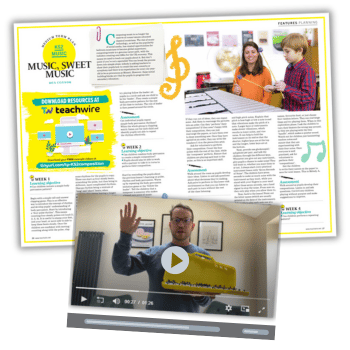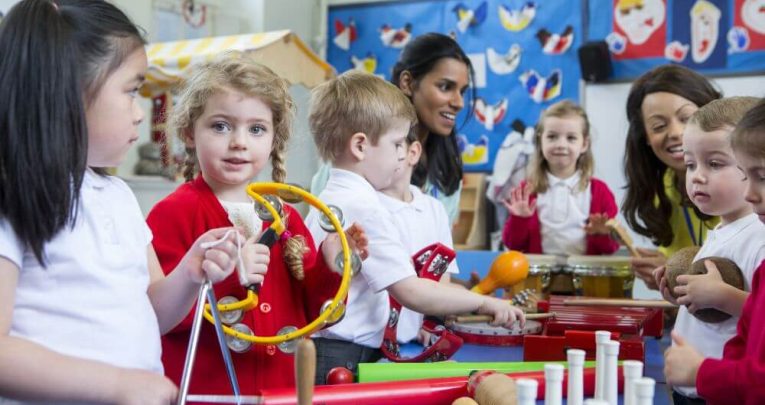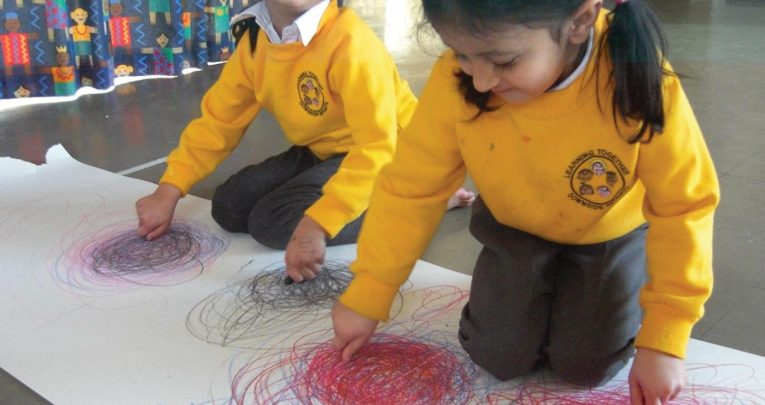Plan your music curriculum to satisfy an Ofsted deep dive

Dr Elizabeth Stafford shows you how to show musical intent by taking these four key factors into account…

- by Dr Elizabeth Stafford
- Internationally recognised music education expert Visit website

We’re now two terms into the ‘new’ Ofsted inspection framework, and schools are gradually getting to grips with the idea of a ‘deep dive’ – a thorough investigation of all aspects of a particular subject area, including its design (intent), delivery (implementation) and assessment (impact).
Whether you’re using a bought-in music scheme or creating your own from scratch, you are going to need a comprehensive curriculum plan to discuss in a deep dive inspection. To draw that up successfully you need to take into account four key factors.
1 | Coverage
The music national curriculum at KS1 and KS2 covers:
- Singing
- Playing tuned and untuned instruments
- Listening to recorded and live music
- Composing and improvising (using the interrelated dimensions of music)
- Understanding music history
- Understanding notation
In my experience, where some schools struggle is to move the music curriculum beyond singing – particularly if they adhere to a topic-based curriculum, where music lessons become a series of opportunities to sing ‘topic songs’ and nothing else.
As you can see from the list above, the national curriculum for music has much more content than just singing, so in order to fulfil its requirements – and satisfy a deep dive – schools need to make sure they are covering all these elements within their curriculum.
Occasionally, I encounter something even more worrying – a music curriculum constructed solely around listening.
In extreme cases this listening is confined to assemblies and registration times. Not only can this not be counted as part of the curriculum, but it also means that pupils do not develop their critical appraisal skills by having the opportunity to analyse or respond to the music.
Again, looking at the list above, this is clearly inadequate in terms of a curriculum, and would raise serious questions in a deep dive situation.
2 | Content
The national curriculum for music at KS1 and KS2 requires pupils to: “perform, listen to, review and evaluate music across a range of historical periods, genres, styles and traditions, including the works of the great composers and musicians”.
This clearly links to Ofsted’s idea of ‘cultural capital’: “the essential knowledge that pupils need to be educated citizens, introducing them to the best that has been thought and said and helping to engender an appreciation of human creativity and achievement”.
In order to ensure that our curriculum satisfies both of the above, we need to ensure that we are exploring a broad range of musical styles, including some which could be said to be ‘high art’ or ‘the best that has been thought and said’.
The latter does not necessarily mean classical music!
The film music of John Williams, the songs of The Beatles, the jazz music of Miles Davis, the musicals of Sondheim, could all be classed as being the very best of their respective genres and therefore worthy of study in their own right, as well as adding considerably to our pupils’ cultural capital.
3 | Structure
The national curriculum for music at KS1 & KS2 does not provide any structural advice for curriculum design beyond the end of key stage expectations. This is not exactly helpful for those subject leaders who are not confident about music themselves!
Music education experts often warn against the idea of separating out the different skills of performing, creating and listening, as several studies have shown that musical progress is better and musical understanding greater when all of these elements are taught in an integrated way.
This means that schools whose curriculum is split into ‘units’ of performing, composing and listening may want to have a rethink to bring their curriculum in line with best practice.
Another issue that any music specialist will tell you is that music is a skills-based subject and therefore needs to be practised little and often.
Schools that use block timetabling for music, rather than timetabling a regular weekly slot throughout the year, will find that musical progress and understanding are slowed as a result.
They may also fail to adequately evidence the ‘balanced’ aspect of a ‘broad and balanced curriculum’ if the equivalent blocked time does not balance well with the amount of time spent on other subjects.
4 | Sequencing
The national curriculum for music at KS1 and KS2 does not provide any curriculum sequencing advice beyond the end of key stage expectations.
To make matters worse, music educators themselves often cannot agree on the ‘correct’ sequencing of learning, particularly when it comes to the issue of reading notation!
For many schools adopting a topic-based approach to learning, there is no real sequence to their music curriculum.
Instead, the content of the curriculum is based on what ‘fits’ with the topic, and the order in which the topics appear does not take into account the logical progression of musical skills.
Clearly at the topic planning stage there needs to be careful consideration of the content of the music curriculum, and the sequence in which pupils acquire and develop musical skills.
Another common mistake with sequencing often occurs when schools buy in whole-class instrumental programmes from their local music education hub, or a private provider.
These programmes (for historical reasons to do with the original pilot schemes) are often targeted at Y4.
However, if the school has no music ‘specialist’ teacher in Y5 or Y6, how are their staff expected to continue the sequence of learning so that children are progressing on from what they learnt from a specialist in Y4?
Clearly either the Y5 and Y6 teachers need additional training, or more specialist provision needs providing in these years, or the whole class programme needs to move to Y6!
When we talk about sequencing, it is important to remember that the development of musical skill is not linear. Music education experts generally all subscribe to the idea of a spiral curriculum, where basic skills are revisited in greater depth and at greater levels of complexity as a child develops.
If your curriculum is divided into units such as ‘pulse’, ‘pitch’, ‘rhythm’ and so on, it’s important to recognise that you cannot just do these things once and then assume that the pupil has ‘learnt’ that and doesn’t need any future input.
In fact, they will need to return to these concepts many times as they develop as musicians.
While schools may view the deep dive process as yet another rod to beat them with, on the plus side it does allow them to reimagine their music curriculum to ensure they are following best practice, which can only be a good thing!
And here’s a word to the wise if you’re tempted to leave the whole thing alone, banking on the fact that Ofsted inspectors are just as scared of music as you are: the deep dive training that Ofsted gave its Inspectors when the new framework came in used music as its exemplar, so it’s possible that this subject might be higher on the hit list than you think!
Dr Elizabeth Stafford is director of Music Education Solutions and senior lecturer in music business and professional studies at Leeds College of Music. Follow her on Twitter at @DrLizStafford. Read advice for preparing for PE deep dive questions.










